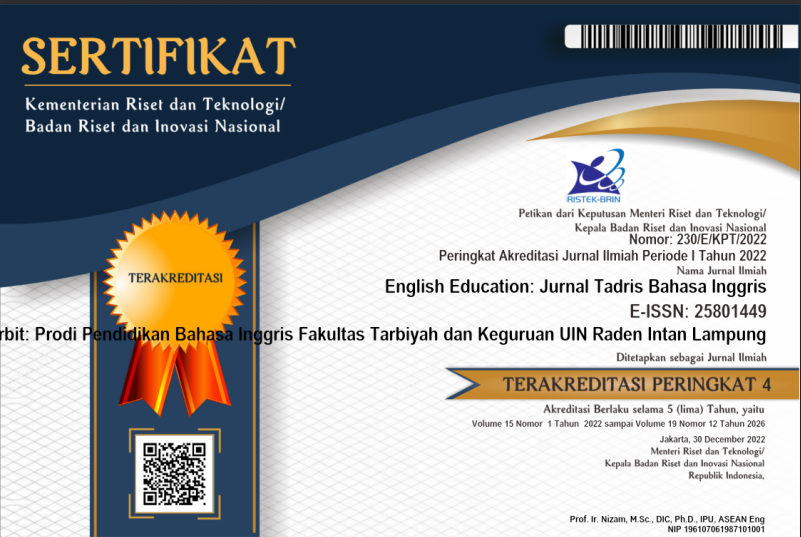EFL Students’ Attitudes Towards Autonomous Learning Through Busuu: A Mobile Application
Abstract
Studies on the appliances of mobile phones have indicated a positive effect on language improvement. This case study attempts to explicate students' perceptions of autonomous learning through Busuu (a language mobile application). The subjects of this study were 17 females and three males of an English language center at a university in Indonesia. The result showed that the use of the Busuu app supported learners’ autonomy. (1) Students controlled over learning management freely managing their time to study and got motivated more to learn English after accessing the app. The findings indicated that the lower the level of competence in English, the longer students spent their time to access the app. (2) Students controlled over cognitive processing by showing their interest in vocabulary practices. Next, students controlled over learning content by selecting which material to study first so that they were able to meet their expectations of accessing the app. At last, (3) students controlled over learning strategies by reflecting on how well they have learned from the automated feedback feature provided in the app. To sum up, students have a positive attitude towards the app in that it helps them enhance their English proficiency skills, especially in vocabulary enrichment.
Full Text:
PDFReferences
Benson, P., & Voller, P. (2014). Autonomy and independence in language learning. Routledge.
Benson, P. (2017). Teaching and Researching Authonomy. Applied Linguistics in Action, 296.
Busuu. (2016). Our 8th anniversary – Busuu in numbers. Retrieved from https://blog.busuu.com/8-years-busuu-numbers/
Burston, J. (2014). The reality of MALL: Still on the fringes. CALICO Journal, 31(1), 103–125.
Castaneda, D.A., & Cho, M.H. ( ~ 2016). Use of a game-like application on a mobile device to improve accuracy in conjugating Spanish verbs. Computer Assisted Language Learning, 29(7), 1195–1204.
Djoub, Z. (2014). Mobile technology and learner autonomy in language learning. In J. Keengwe (Ed.), Promoting Active Learning through the Integration of Mobile and Ubiquitous Technologies (194-212). IGI Global. https://doi.org/10.4018/978-1-4666-6343-5.ch012
Khaddage, F., & Lattemann, C. (2013). The future of mobile apps for teaching and learning. In Z.L. Berge & L. Muilenburg (Eds.), Handbook of mobile education (pp. 119–128). New York, NY: Routledge.
Ketyi, A. (2013). Using Smart Phones in Language Learning – A pilot study to turn CALL into the MALL. In L. Bradley & S. Thou€esny (Eds.), 20 Years of EUROCALL: Learning from the Past, Looking to the Future. Proceedings of the 2013 EUROCALL Conference, Evora, Portugal (pp. 129-134). Dublin, Ireland: Research-publishing.net.
Ketyi, A. (2015). Practical evaluation of a mobile language learning tool in higher education. In F. Helm, L. Bradley, M. Guarda & S. Thou€esny (Eds), Critical CALL – Proceedings of the 2015 EUROCALL Conference, Padova, Italy (pp. 306-311). Dublin: Ireland: Research-publishing.net
Miles, M. B., & Huberman, A. M. (1984). Qualitative data analysis. London: Sage.
Rosell-Aguilar, F., & Kan, Q. (2015). Design and user evaluation of a mobile app to teach Chinese characters. JaltCALL Journal, 11(1), 19–40.
Rosell-Aguilar, F. (2016). User evaluation of language learning mobile applications: A case study with learners of Spanish. In A. Palalas & M. Ally (Eds.), The International Handbook of Mobile-Assisted Language Learning (pp. 545–581). Beijing: China Central Radio & TV University Press.
Rosell-Aguilar, F. (2017). State of the app: A taxonomy and framework for evaluating language learning mobile applications. The CALICO Journal, 34(2), 243–258.
Rosell-Aguilar, F. (2018). Autonomous language learning through a mobile application: a user evaluation of the busuu app. Computer Assisted Language Learning, 29.
Stockwell, G., & Hubbard, P. (2013). Some emerging principles for mobile-assisted language learning (pp. 1–15). Monterey, CA: The International Research Foundation for English Language Education.
Stockwell, G., & Liu, Y.C. (2015). Engaging in mobile phone-based activities for learning vocabulary: An investigation in Japan and Taiwan. CALICO Journal, 32(2), 299–322.
Vesselinov, R., & Grego, J. (2016). The busuu efficacy study. Retrieved from http://comparelanguageapps.com/documentation/The_busuu_Study2016.pd
DOI: http://dx.doi.org/10.24042/ee-jtbi.v13i2.7027
License URL: https://creativecommons.org/licenses/by-sa/4.0
English Education: Jurnal Tadris Bahasa Inggris, UIN Raden Intan Lampung is licensed under a Creative Commons Attribution-ShareAlike 4.0 International License. pISSN: 2083-6003, eISSN: 2580-1449.









